Portraits of Struggles
by Jack Foran
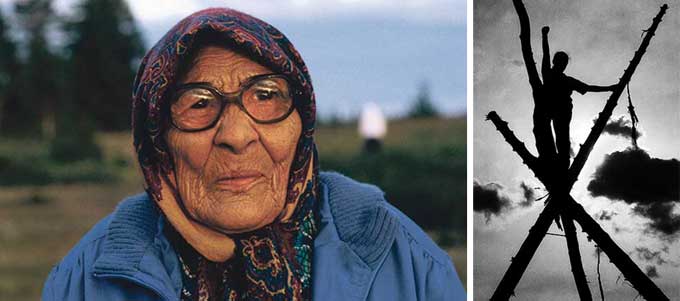
Orin Langelle's photographs on display at iBuen Vivir! gallery
Photographer Orin Langelle’s website concludes with two quotations. From Brazilian educator and philosopher Paolo Freire: “Washing one’s hands of the conflict between the powerful and the powerless means to side with the powerful, not to be neutral.” And folksinger and activist Phil Ochs: “It is wrong to expect a reward for your struggles. The reward is the act of struggle itself, not what you win. Even though you can’t expect to defeat the absurdity of the world, you must make that attempt. That’s morality, that’s religion. That’s art. That’s life.” They pretty much sum up Langelle’s life and work.
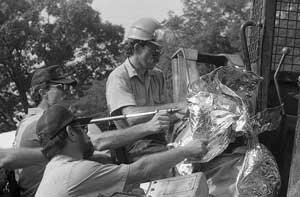
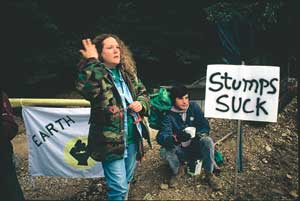
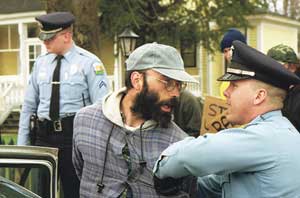
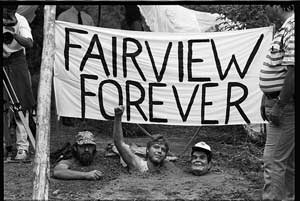
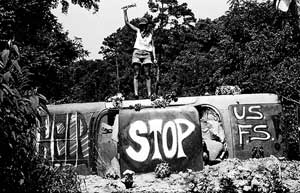
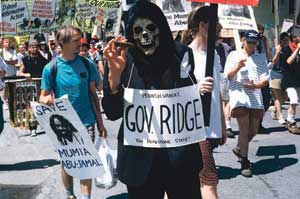
A potpourri of his witness to the struggle photos from the 1980s and 1990s is currently on view at his ¡Buen Vivir! gallery on Elmwood in Allentown. Including the iconic photo of an unidentified environmental activist, poised on a log tripod construction, arm and fist raised in spirited gesture of we shall overcome, at a training camp in non-violent disruption techniques in Vermont in the late ‘90s.
The exhibit is dedicated to the memory of activist Judi Bari (1949-1997), an activist against redwood logging in northern California who narrowly escaped death when her car was blown up by a pipe bomb—following which she was arrested by the FBI on charges of eco-terrorism. The FBI alleged she had been transporting explosives. Laboratory and other analyses discovered that the explosives in question were placed directly under the driver’s seat and equipped with a motion sensor trigger to cause them to detonate when the car was driven, whereupon the Oakland District Attorney declined to press the FBI charges. Bari filed a violation of civil right suit on matters including false arrest and illegal search. Five years after her death her estate was awarded $4 million in the case.
The targets of the protests to which Langelle’s photos bear witness range from roadway expansion schemes in London, England, to golf course expansion and development of condominiums on land sacred to the Mohawk Indians, to logging activities within the Trail of Tears State Forest in Illinois, to Hydro-Quebec plans for hydroelectric production facilities on Cree Indian lands in northern Canada, to a protest against the Tasmanian Forestry Commission, Australia, an agency that is supposed to protect forests from rapacious practices of commercial timber interests, for failing to do so.
One photo is of an activist arrested—in New Hampshire—for handing out fliers urging people to write to their representatives in Congress in opposition to a timber harvest scheme in the White Mountain National Forest. Another—in Vermont—shows Abenaki Tribal Chief Homer St. Francis standing up in court, when he was told he was “out of order,” responding, “No, Judge, you’re out of order.” The Abenaki apparently had never ceded their land to any state or federal government, and continued to issue their own license plates and hunting and fishing permits. They were demanding that all Abenaki land be returned to them. Ultimately, the Vermont Supreme Court ruled that all Abenaki claims had been “extinguished due to the increasing weight of history.” History apparently was to blame.
Not all the protest activist photos show protest actions. There is a wonderful portrait of a Cree elder woman, looking ancient and patient—but not infinitely patient—taken during the photographer’s journey to Cree territory to learn about and document the struggle against the Hydro-Quebec project. The second phase of the project, that is. The first phase, the La Grande Project dam, had already flooded thousands of acres of Cree land, displacing resident natives and resulting in environmental devastation such as when an untimely water release drowned 10,000 migrating caribou. The second phase was another dam proposal that was postponed indefinitely following protests in Canada and worldwide. One photo shows protesters in front of the Quebec consulate in London with a banner denouncing the hydropower scheme. The second phase was ironically well-named. It was called the Great Whale Project.
The exhibit continues through June 19, at which time Langelle will give a walk-through and talk about the various photos, scheduled from 6 to 8 pm. ¡Buen Vivir! Gallery is located at 148 Elmwood Avenue.
blog comments powered by Disqus|
Issue Navigation> Issue Index > v14n23 (Week of Thursday, June 11) > Portraits of Struggles This Week's Issue • Artvoice Daily • Artvoice TV • Events Calendar • Classifieds |









 Current Issue
Current Issue